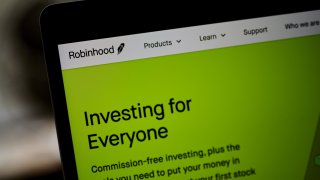
Critics View Robinhood Restricting GameStop Trades as ‘an Absolute Travesty’
A Naperville attorney filed a lawsuit Thursday against brokerage app Robinhood following its decision to restrict customers from buying stock in companies such as GameStop and AMC whose values were boosted by organized online traders.
GameStop stock has rocketed from below $20 earlier this month to close around $350 Wednesday as a volunteer army of investors on social media challenged big institutions who had placed market bets that the stock would fall.
Robinhood announced Thursday that it had limited trade in GameStop and other stocks targeted by investors on the irreverent WallStreetBets Reddit forum, citing “recent volatility.”
After the market closed, Robinhood said it would allow limited buying of those securities starting Friday.
Besides GameStop, Robinhood said trading in stocks such as AMC Entertainment, Bed Bath & Beyond, Blackberry, Nokia, Express Inc., Koss Corp., American Airlines, Tootsie Roll, Trivago and Naked Brand Group would be affected by the new restrictions.
According to a complaint filed in the U.S. District Court for the Northern District of Illinois, Richard Gatz, a Naperville attorney, owned two options contracts for BlackBerry at the time of the trading halt, and the value decreased by almost 200%.
While unconfirmed, Gatz alleged Robinhood continued to allow trading for institutional investors who "have benefitted from the stoppage of retail investment."
Local
"Plaintiff is unable to get fair market value for his options contracts and the manipulation has caused the price of the BB to fall," the lawsuit stated. "If the stocks are not allowed to be trading it is likely that Plaintiff will take a financial loss solely due to the Defendant's behavior and manipulation of their trading platform..."
Gatz requested that the court require Robinhood to continue to allow trading of the previously mentioned securities, so "they can trade at their actual market value upon retail and institutional investment."
The frenzy surrounding shares of GameStop, AMC and the other companies has drawn in an influx of investors with little or no experience trading stocks. That poses a challenge for brokerages that cater to small investors, said Andy Nybo, managing director at Burton-Taylor International Consulting.
“The brokers were forced to take action because they would be in the firing line if an unsophisticated investor loses money,” he said.
The surge in the use of stock options fueled by individual investors has some brokerages nervous and explains why some have taken steps to restrict trading. The potential issue centers on the possibility that a brokerage that isn’t capitalized well enough could run into trouble if a large number of investors suddenly lose money on options trades that don’t go their way.
Brokerages often lend investors money to make their trades, and could be exposed to huge losses if many investors are suddenly wiped out and can’t pay back the borrowed funds.
In an interview Thursday on CNBC’s “Closing Bell,” Interactive Brokers chairman and founder Thomas Peterffy laid out some of the concerns that prompted his brokerage to limit trading.
“If our customers are unable to pay for their losses, we have to put up our own money,” he said, adding that Interactive Brokers “doesn’t have a problem,” as it has $9 billion in equity as a cushion.
Robinhood’s stated goal is to “democratize” investing and to bring more regular people into investing. The company has forced huge, ground-shaking changes for the brokerage industry, such as its decision to charge zero commissions for customers trading stocks and exchange-traded funds. That’s why some users took Thursday’s actions as an affront.
Investors upset over the trading portals’ restrictions are getting some sympathy from some members of Congress.
Democratic Sen. Sherrod Brown of Ohio, who is set to become chairman of the Senate Banking Committee, announced that he will hold a hearing on the GameStop situation. Rep. Maxine Waters, D-Calif., also announced a hearing in the House Financial Services Committee.
Rep. Alexandria Ocasio-Cortez, D-N,Y., called Robinhood’s actions “unacceptable,” and said she would support a hearing to explore why the online brokerage is blocking small investors from buying stocks while hedge funds “are freely able to trade the stock as they see fit.”
Kalen Holliday, a spokeswoman for Interactive Brokers, said the company’s restrictions apply both to individual and institutional investor accounts.
Democratic Rep. Ro Khanna, whose California district sits in Big Tech’s Silicon Valley, called for “more regulation and equality in the markets.” In a statement Thursday, Khanna accused Wall Street of spending billions to “crush” GameStop and “put workers out of business” instead of investing in future technology.
The recent surge in GameStop has been the product of a tug-of-war between small investors and some big institutions. Citron Research and Melvin Capital had placed bets that GameStop shares would fall as the company tries to transform itself from a bricks and mortar retailer to a seller of online video games.
But smaller investors rallied to the stock.
By sending GameStop shares soaring higher, they forced the big players to cover their bets by buying the stock, increasing the price even further. But there is some concern that small investors could face significant losses when and if stocks like GameStop plummet.
The Securities and Exchange Commission said Wednesday that it was monitoring the stock and options markets. Protecting investors is one of the jobs of the SEC, but it’s not clear what the agency can do in a case like GameStop, said Chester Spatt, a former chief economist at the SEC and a finance professor at Carnegie Mellon University.
Smaller investors are using Reddit and other discussion boards to encourage each other to buy GameStop, but that may not be much different than big investment houses giving their brokers marching orders each morning on which stocks to try to push that day, he said.
Regardless, Spatt said regulators will likely feel pressure to look at it deeply. “At some point, things shooting up in these kinds of ways are going to come crashing down,” he said. “People are going to be crying out, ‘Where were you, and why didn’t you protect these investors?’”



